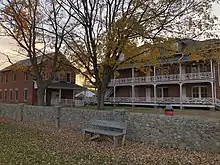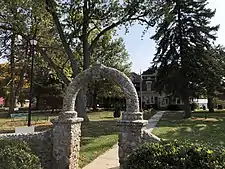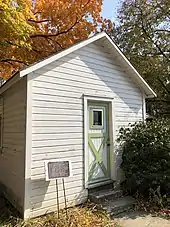Wood County Museum
The Wood County Museum, located in Bowling Green, Ohio, is the original site of the Wood County Infirmary also known as the Wood County Home or the Poor Farm. This structure was the home to poor, mentally- ill, physically disabled and anyone in need of public assistance who were residents of Wood County.
 | |
Former name | Wood County Infirmary |
|---|---|
| Established | 1975 (Museum) |
| Location | 13660 County Home Road, Bowling Green, Ohio[1] |
| Type | History museum |
| Website | woodcountyhistory |
History
Infirmary
| Wood County Infirmary | |
|---|---|
 | |
| Geography | |
| Location | Bowling Green, Ohio, United States |
| History | |
| Construction started | 1868 |
| Opened | 1869 |
| Closed | 1971 |
| Links | |
| Lists | Hospitals in Ohio |
The main Infirmary building was built in 1868.[2] Regulations by the State of Ohio prescribed a minimum standard of living in the construction, including minimum square footage per person, healthy food, and clean laundry, among other amenities.[1] The Infirmary opened in 1869 where it also operated as a Poor Farm, giving it a degree of self sufficiency.[1][3] The presence of an Infirmary in Bowling Green was a contributing factor that helped it gain status as County Seat instead of Perrysburg, Ohio.[3]
In 1885 a Lunatic House was built on the grounds to house the mentally ill.[3] Many of the first residents to live there had been moved from prior quarters in the waterlogged basement of a jail in Perrysburg, Ohio.[3] Treatments prescribed included fresh air, Laudanum with Mercury and Alcohol added, and Herbal medicine.[3] The Lunatic House ceased operations in the 1930s, when it was converted to serve as a hospital and dormitory for families during the Great Depression.[3]
By 1898 the east and central wings of the infirmary were condemned and rebuilt.[2] Oil wells built on the property as a result of the Ohio oil boom supplied heating and lighting oil until 1904, and the lack of heating in the East and Central wings was again an issue in 1979.[2] In the 1920s the director of the Infirmary hand built a stone wall around the site.[2][4] From 1935 on, the Infirmary shifted operations to be closer to a nursing home.[1]
The Paupers Cemetery contains at least 355 burials.[5] Removal of the headstones to make mowing the lawn easier made identification difficult.[3]
Museum
On 1971 the Infirmary closed its doors and residents were moved to a new location.[4] Between 1971 and 1974 the vacant building was heavily vandalized.[2] Lyle Fletcher, a local historian and director of the city parks convinced the county commissioners to save the building.[4] By spring 1975 the building opened as the Wood County Museum.[4] As of 2018 the complex was one of the few preserved poor houses remaining in Ohio.[6] The building was listed on the National Register of Historic Places in 1979.
The Museum was shown on WBGU-TV program Scenic Stop, which premiered December 6, 2012.[7]
Exhibits
The Museum is home to over 30 exhibits about this building's history and the social history of Wood County.
Outbuildings
There are several outbuildings, including a pest house to isolate men with communicable diseases such as scarlet fever and influenza, a hog barn and an ice house.
Gallery
 Oil Derrick
Oil Derrick Pest House
Pest House Lunatic House
Lunatic House The hog barn
The hog barn Log Cabin
Log Cabin
References
- McLaughlin, Jan Larson. "'Poor farm' exhibit examines historical safety net for 'worthy poor' – BG Independent News". Retrieved 13 October 2020.
- Flick, Jim (25 May 1979). "Hundred-year-old mansion captures county history". BG News (Student Newspaper). No. The BG News May 25, 1979. Retrieved 13 October 2020.
- Ellsworth, Katy (8 March 2001). "Building under repair housed the 'lunatics'". BG News (Student Newspaper). No. The BG News March 8, 2001. Retrieved 13 October 2020.
- Whitakar, Cindy (9 July 1981). "'Hall of muses' full of Wood County history". BG News (Student Newspaper). No. The BG News July 9, 1981. Retrieved 12 October 2020.
- Petkosik, Amber (22 October 2012). "'Infirmary tours' return for fall". BG News (Student Newspaper). No. The BG News October 22, 2012. Retrieved 13 October 2020.
- McLaughlin, Jan Larson. "Kling grows into job as county historical center director – BG Independent News". Retrieved 13 October 2020.
- "WBGU-TV Scenic Stops - Wood County Historical Center and Museum". wbgutv.org. Retrieved 13 October 2020.
- "A WIFE MURDERER HANGED". timesmachine.nytimes.com. Retrieved 1 February 2021.
- "Horrible Murder in Ohio--A Father Kills His Son". The New York Times. 19 August 1867. Retrieved 13 April 2022.
- "Wood Co. museum rethinking how to show fingers of 1881 murder victim". Sentinel-Tribune. Retrieved 7 October 2019.
- Feehan, Jennifer. "Museum's jar with 3 fingers tells brutal tale". The Blade. Retrieved 7 October 2019.
External links
![]() Media related to Wood County Museum at Wikimedia Commons
Media related to Wood County Museum at Wikimedia Commons